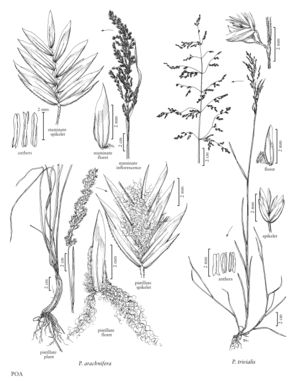Poa arachnifera
Plants perennial; loosely tufted, rhizomatous, rhizomes slender. Basal branching intra- and extravaginal. Culms 20-85 cm, erect, terete or weakly com¬pressed; nodes terete, 0-1 exserted. Sheaths closed firmly for 1/7-1/3 their length, sometimes for a longer distance by a hyaline membrane, terete, smooth, glabrous, bases of basal sheaths glabrous; ligules 1-4 mm, smooth or scabrous; innovation blades 10-35 cm long, 1-3.5 mm wide; cauline blades 2-25 cm long, 1.5-4.5 mm wide, flat or folded, lax, both surfaces smooth or sparsely finely scabrous, glabrous, apices narrowly to broadly prow-shaped. Panicles 3-12(18) cm, erect, narrowly cylindrical, often interrupted or lobed, congested, with (70)100-200 spikelets; nodes with (2)3-7(9) branches; branches 1-3(5) cm, erect to slightly ascending, terete or weakly angled, sparsely to densely coarsely scabrous, with 8-30 spikelets. Spikelets 4-8(10) mm, sexually dimorphic, laterally compressed, pistillate spikelets larger, with fewer florets and more pubescence than the staminate spikelets; florets 2-10; rachilla internodes smooth. Glumes unequal, distinctly keeled, keels and lateral veins scabrous; lower glumes 1-3-veined. Staminate florets: calluses glabrous or sparsely dorsally webbed, hairs plicate, rarely with additional webs under the marginal veins; lemmas 3.5-5 mm, lanceolate, distinctly keeled, keels and marginal veins sparsely short- to long-villous, margins glabrous, apices acute; palea keels scabrous, glabrous or softly puberulent to long-villous at midlength; anthers vestigial (0.1-0.2 mm) or 1.6-2.7 mm. Pistillate florets: calluses copiously 3-webbed, hairs 4-10 mm, mostly silky, plicate; lemmas 4.2-6.4 mm, lanceolate, 5-7 veined, distinctly keeled, glabrous, or the keels and marginal veins, sometimes also the lateral veins, densely long-villous, margins glabrous, apices acute; palea keels scabrous, glabrous or sometimes softly puberulent to long-villous at midlength. 2n = 42, ca. 54, 56, ca. 63, 84.
Distribution
Kans., Okla., Miss., Tex., La., N.C., Ala., Tenn., Ark., Ill., Ga., S.C., Fla., N.Mex.
Discussion
Poa arachnifera grows on moist, sandy to rich, black bottomlands of the southern Great Plains. At one time it was cultivated for winter pasture in the southeastern United States. It is strictly dioecious, with a 1:1 ratio of staminate to pistillate plants among herbarium samples. The variable and high chromosome numbers suggest it may be apomictic, but the occurrence of equal numbers of staminate and pistillate individuals in populations seems to suggest that reproduction is primarily sexual. It is the only non-South American species in the section. Its closest relatives appear to be P. bonariensis (Lam.) Kunth and P. lanuginosa Poir.
Selected References
None.
